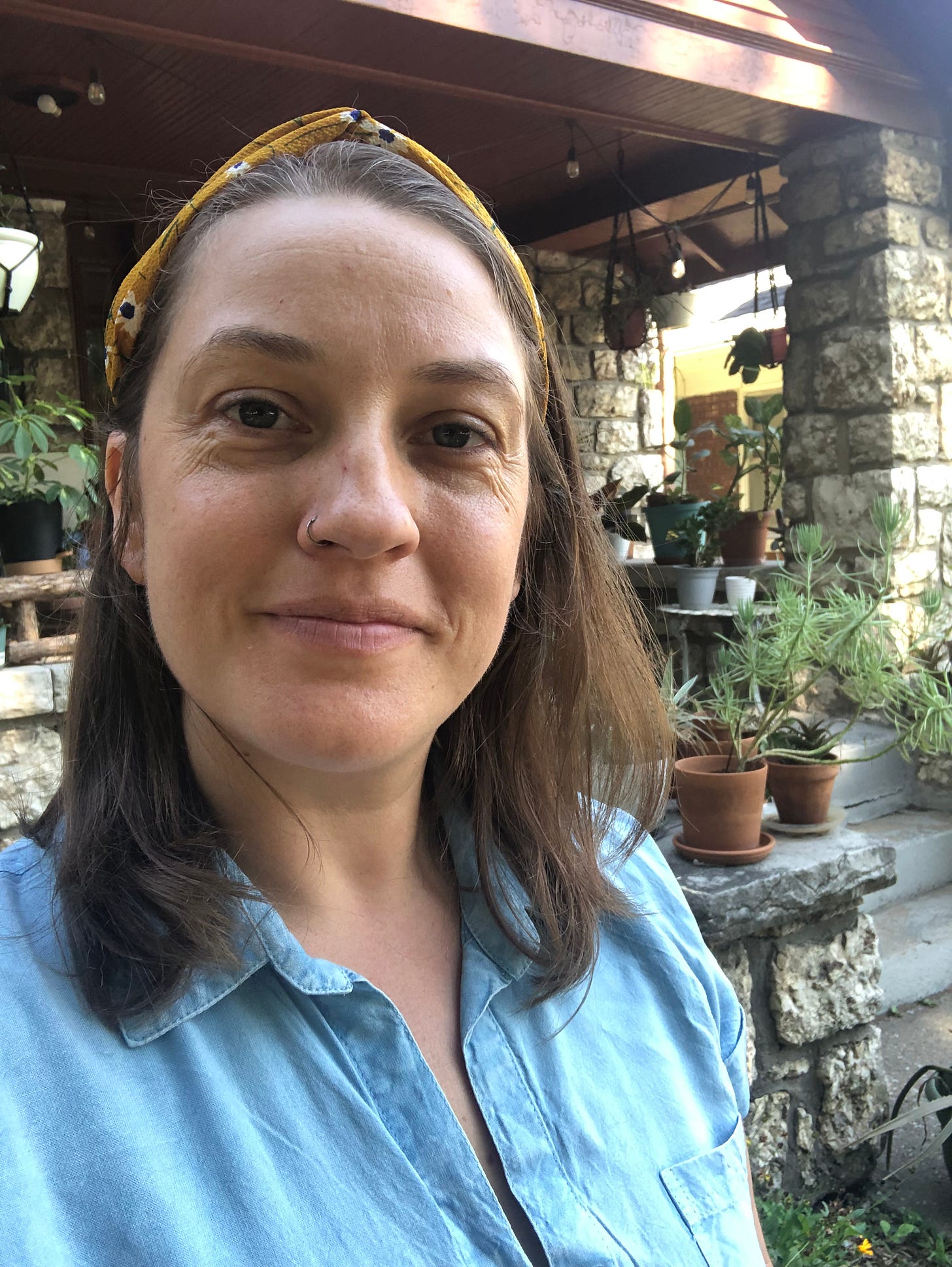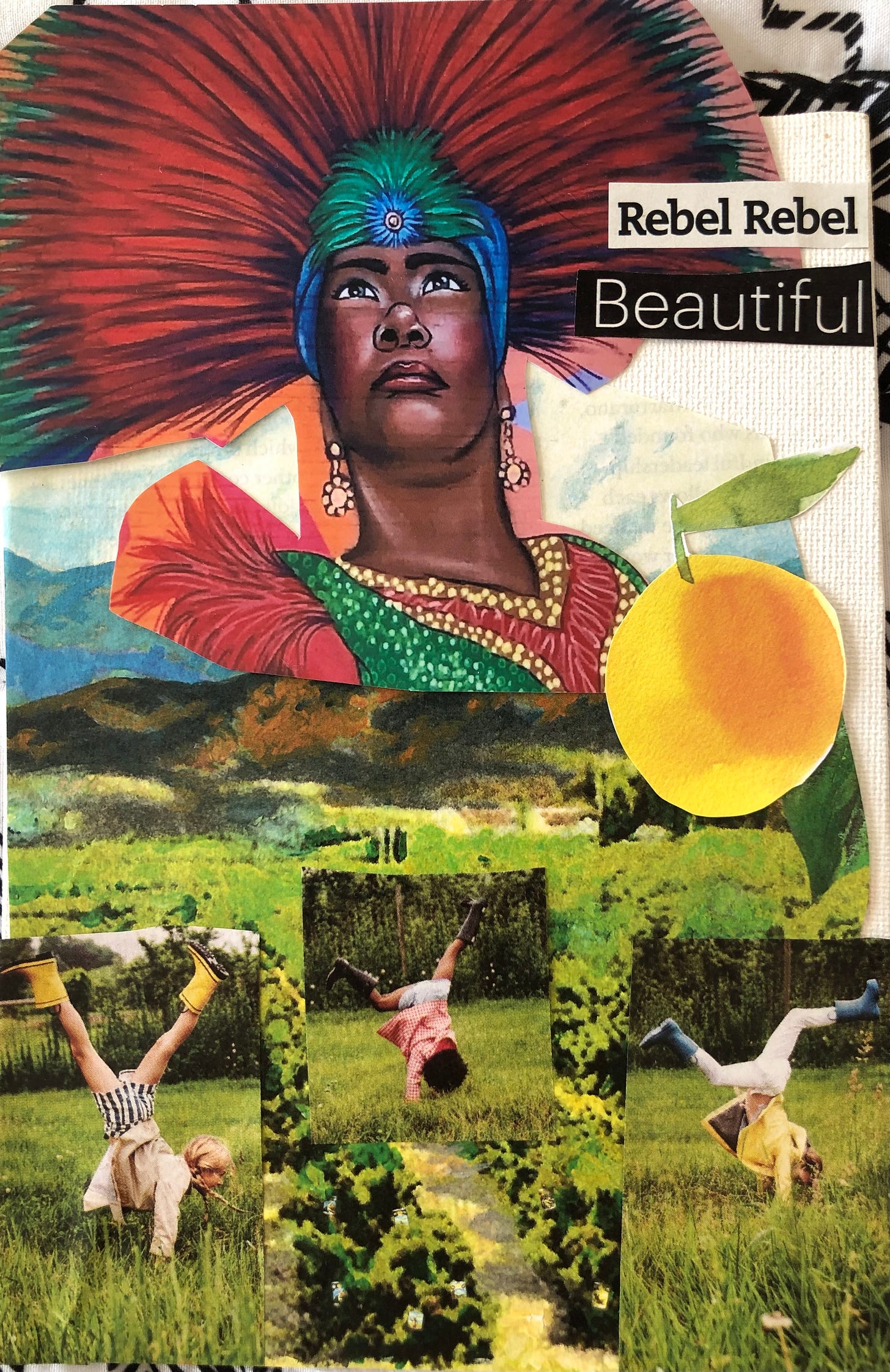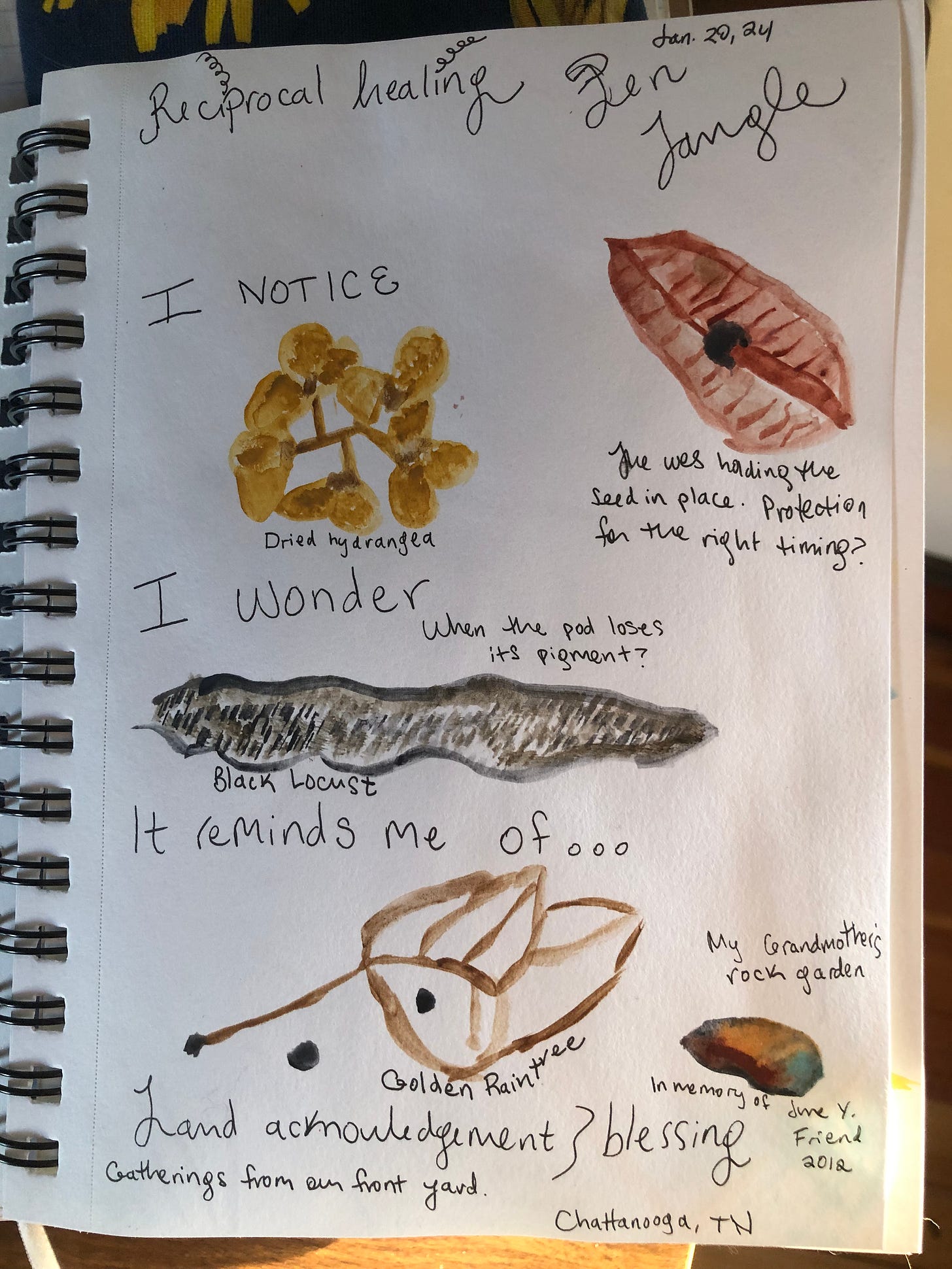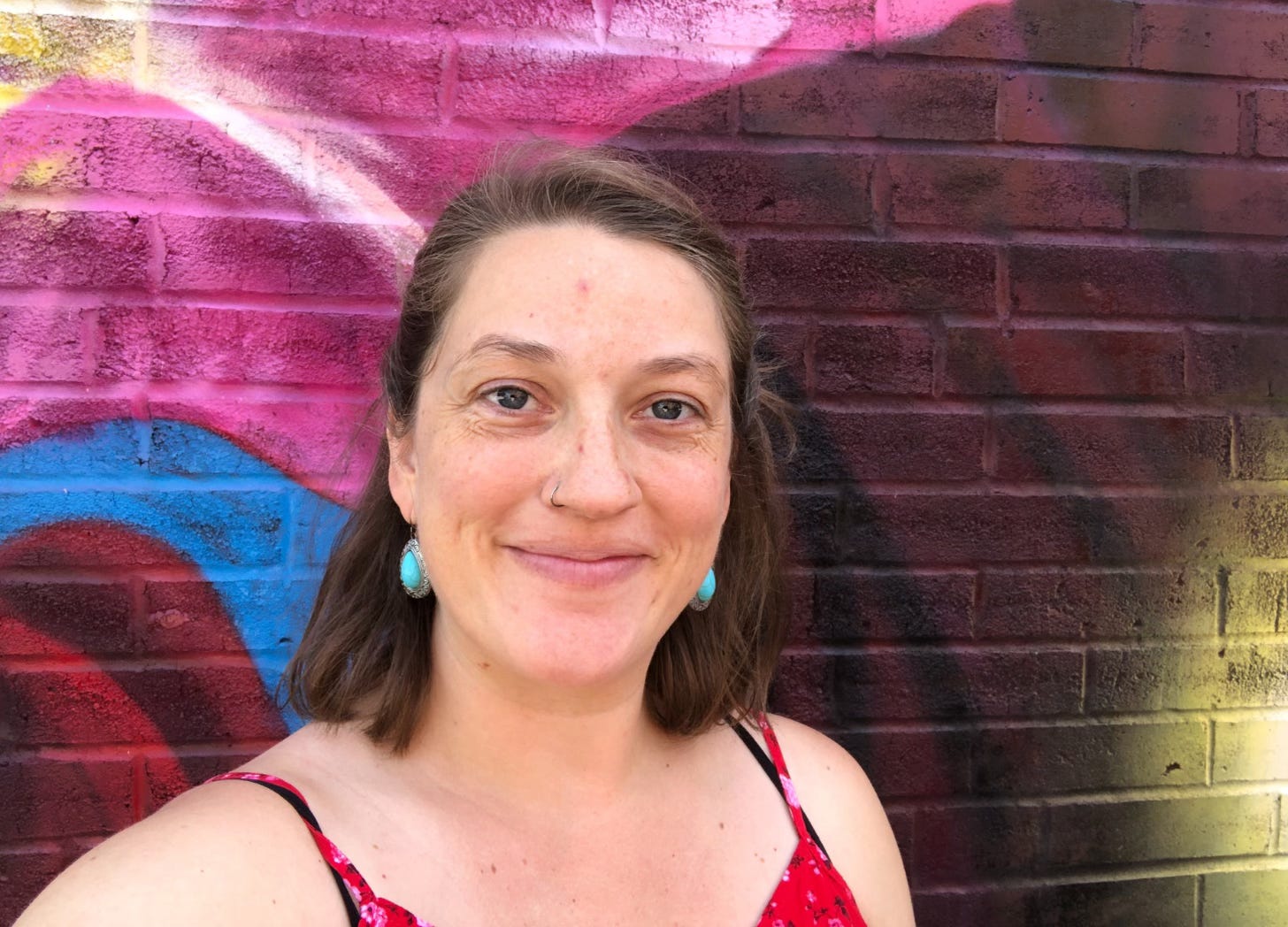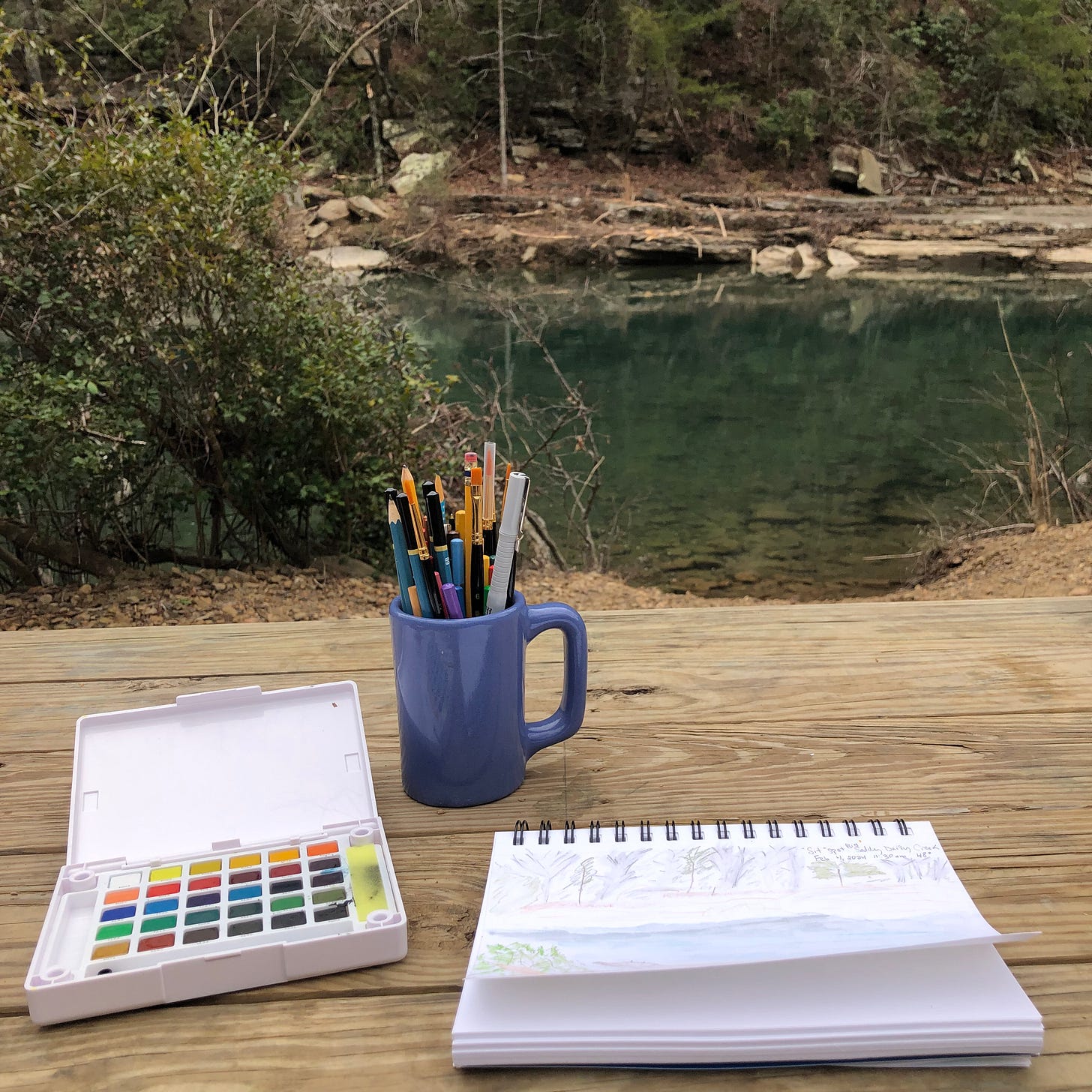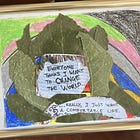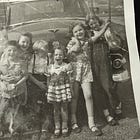Meet Mariah: An Art Meets Mental Health Interview
"Being creative is like reclaiming your power in the world. It's building the capacity to not just have things happen to you but to respond with art."
You know how sometimes you meet someone new and instead of just hanging out in the realm of “what do you do?” small talk, you dive below the surface almost immediately, cutting through all of the unnecessary to get to the heart of things? That’s what I felt like going through this interview with Mariah Friend of Heartbeats.
She dives right into the real stuff from the moment she’s asked how she’d like to introduce herself:
I am constantly finding new ways to introduce myself, to gather the mismatched, fragmented parts and stitch them together, to re-orient myself on the shifting landscape of life.
Where am I and who am I now? I'm traversing the terrain of new motherhood, standing on the borderland of grieving daughter, and emerging artist. I'm a former ICU nurse turned poet, looking for ways to heal both body and soul with the realization that the disease is often the medicine and the only meaning we really have is the meaning we make.
The disease is also the medicine … I don’t think I’ve ever heard that before, but it resonates so deeply. What would you say has been your personal experience with mental health?
For me, there's such a stigma to it, even as a healthcare professional. There's a history of depression and anxiety in my family that goes back several generations, yet I've always struggled with placing myself firmly in that category. I think there's been an undercurrent of depression since childhood but the first time I actively sought help for it was when I became suicidal in college. It was so scary and I was so numb, I honestly wasn't sure I would survive.
Moving through that experience, I realized that for me, depression comes into play when my anxiety isn't managed well or gets sort of out of control. It's almost this feeling of exhaustion that occurs when my anxiety has run out of steam. Thankfully, I've been able to manage my anxiety fairly well through habits and rituals that tend to my overall wellbeing (journaling, yoga, healthy eating, walks in nature, community support, etc.), but to be honest it can be exhausting and require a lot of energy to keep it in check.
I find that there’s almost always a relationship between anxiety and depression, which is often hard to articulate. The way you’ve described it makes a lot of sense to me - the anxiety has run out of steam. The way I’ve expressed it before, which is a little different, is that I often felt like I was trying to outrun my depression. I would try a million new things to generate some energy which would really generate anxiety and I’d eventually crash. For a long time, I saw myself as a person with depression, not anxiety, but the anxiety was always there as a part of it.
I'd never gotten a formal diagnosis of anxiety until the summer after my father died. It was the second year of the pandemic, I was a new school nurse, and I just couldn't cope anymore. It made me realize what a big part of my mental health my Dad was for me. Grieving that loss and missing his support, all of my usual strategies just weren't helping. I went to my nurse practitioner and asked for medication to support my anxiety and started taking that in 2022.
A few months later, I became unexpectedly pregnant which was sort of a miracle and also its own stress! I was able to keep taking my medication through that pregnancy and last year in November 2023, I saw a psychiatrist for the first time and received a diagnosis of PTSD (which I'd suspected for quite some time). I began taking Zoloft (but just started weaning myself off again) and I could tell a difference in my nervous system. He told me something I'd never thought of before, "You can't treat the anxiety without treating the PTSD," which was a helpful reframe for me.
What a powerful reframe. I also want to pause to hold space for the loss of your dad. I lost mine in 2022, and it’s something I’m still processing.
(Breathe …)
Okay, let’s talk about art and creativity. What can you share about your history as an artist? When and it what ways did art become important to you? What does being creative mean to you?
I'm primarily a writer and poet but I'm starting to lean into other creative expressions such as visual journaling and collage making. I've kept a journal since the 5th grade and I think it was so necessary for me to have that form of processing my world. It's been a lifeline, something I turn to in my most confusing and painful moments. Being creative is like reclaiming your power in the world. It's building the capacity to not just have things happen to you but to respond with art. To have a conversation with what you're experiencing and become an active participant, which I think is extremely important for survivors of trauma.
Do you find that the approach of having a conversation with what you’re experiencing defines/influences/affects the content of what you create?
I recently started sharing the poetry I wrote in the years after my Dad passed away while I was becoming a new mom. I think that collection is the biggest example of how I've used art to respond to something I didn't know how to hold. My body was grieving at the same time I was growing new life and it was such a weird and beautiful time. Poetry helped me find a vocabulary for the emotions I couldn't put into ordinary language.
I think pain and suffering have been fairly consistent themes for my writing, whether it's poetry or non-fiction. I feel like I'm holding all of it up under a magnifying glass, looking for the light in the dark. Creating art has helped me become more resilient and notice the resiliency in life, too. So I think there's that thread of hope and resiliency woven through my writing, while acknowledging the loss and heartbreak.
When I got the call that it was time for me to fly out to be with Dad in the last days, I was at an annual Gingerbread House Making Party that I have been throwing for nearly twenty years. So many of my close friends and loved ones were there, laughing and playing and creating colorful designs, and I remember standing there and thinking that it was the most creative, light place that I could possibly be while also hearing some of the darkest news I would ever receive. I think it was the first time I really understood how those two things can both be held at the same time.
But I digress … Okay, so you were describing how your mental health impacts the content of what you create. How would you say it has affected your creative process?
Follow-through is my biggest challenge. Having anxiety makes everything seem urgent all at once. My anxiety thrives on the newness of a project, on the idea of it. I LOVE getting an influx of inspiration and chasing it down a rabbit hole. Focusing on one thing at a time is incredibly difficult for me, especially when it becomes tedious (it's taken me ten years to finish writing my first book because I hate editing and revising).
I also have to be really cautious not to find my self worth in how much I can accomplish or how many tasks I can complete. Living with anxiety distorts my ability to accurately estimate my capacity and so most of my goals and to-do lists just aren't realistic, especially now that I have a toddler I'm caring for full-time. When I fall short of my own expectations or fall sick or something comes up that I need to adjust, I can be really critical of myself and frustrated by not adhering to the original timeline I created for a certain project or task.
Ah yes, the perfectionism side of anxiety. How would you say that’s impacted your productivity or approaching creativity with more of a business mind?
I think in the initial stages of a project I can be very productive but then usually end up burning out. Learning how to pace myself is a challenge and when something doesn't happen in the timeframe I think it should, I tend to give up or pivot to a different, more exciting project. On the outside, this probably appears extremely flaky. I think it's also hard to clearly define what I'm doing to others because it's such a vibrant mix of a lot of things.
So clarity and consistency, two important factors in starting a business are often lacking in how I share my art.
I think the key might be in recognizing that this might be perceived in a certain way without diminishing the beautiful value of having a mind that is working on “a vibrant mix of a lot of things.”
I want to circle back to your medium … mostly writing but leaning into the other stuff … has anxiety influenced your choice of medium?
I think living with anxiety makes everything seem sped up. There's a quickness to the pace that's not always real but drives the sorts of projects I'm willing to do or excited to try. For instance, if I know something will take a long time to finish or learn, I'm less likely to start. Anxiety creates this sense of urgency about everything and if I can't do something quickly I'm less motivated to try it. I can write quickly which is probably one reason I've stayed with it for so long.
I’m curious how you relate to your identity as an artist/writer and how that might be affected by anxiety …
I think there's a correlation between anxiety and perfectionism and that's definitely played a part in my willingness to even call myself an artist or writer. It's like I'm looking for the proof from someone else that I've earned it. Living with anxiety means I have a hard time self-regulating so I think that need for validation from external sources is part of that, as well.
Do you think others see you as “a writer with anxiety”?
I'm not sure if it's truly how others perceive me or just my insecurity around it. I worry about being seen as flaky, not following through, non-committal, a little "ungrounded" if you will.
And yet, you keep writing. We keep creating in part because of how it helps and heals us. What have been the biggest benefits of creativity for you?
Writing has definitely been a life saver. More recently, I joined a nature journaling class that's been so healing and restorative. We meet in a small group for several hours once a month and just let our creativity loose. It's uncensored play and surrendering to the act of creating without having a goal or objective in mind is so nurturing.
In what ways have you seen art help others?
Oh wow. How has it not? What stands out to me the most is art that was created during the world wars. In particular, I had the opportunity to visit an interment camp in France that held prisoners before they were taken to concentration camps. This particular place was an old warehouse where many intellectual and artistic men were held during WWII. Inside the mill some of them had created art on the walls and they even had their own little theater where they'd perform. It sounds insane given the conditions but I imagine it was life sustaining and necessary for their survival.
I just read a reference to that in an old interview with artist Sam Gilliam.
“The biggest experience for me was a visiting artist coming from Paris, who said that if it wasn’t for the music of America, the Nazi concentration camp would have been miserable. In particular they referred to the singer Marian Anderson.”
Art is so powerful. But it’s not always healing. Would you ever say it’s been harmful for you?
I think it can lead to burnout if I'm not careful. I've been trying to discern the difference between being creative and being productive lately, really leaning into how they feel differently in my body and head space. I confuse them, often. Making art can feel really urgent and I think when I fail to set boundaries around it and trust the process, it can lead to overwhelm and a crash and burn sort of episode.
That is so well said. And I imagine that hard to learn to discern.
Is there any other way that art feels complicated or not entirely cathartic?
Hmm, sometimes I think it can be a medium for us to dwell on tragedy rather than process it and move on. For example, with poetry or writing that comes through from a traumatic event.
That’s another thing that can be tough to discern - is this helping me process or is this just triggering more difficulty for my mind?
So does art heal us? In your own words, what do you think is the relationship between art and mental health?
I think art is the result of a process that can be rooted in creativity or productivity. When it's truly creative, it liberates, heals, and nourishes our soul. It doesn't need an outcome or external validation to be successful. When art is the result of being productive, it's not always negative but it's not always positive, either. I think if we stay in that mode too long, our true creativity is compromised and it can lead to burnout and resentment, as well as a lack of faith in our ability to innovate.
Thank you so much for this powerful conversation Mariah!
Check out more of Mariah’s inspiring work:



